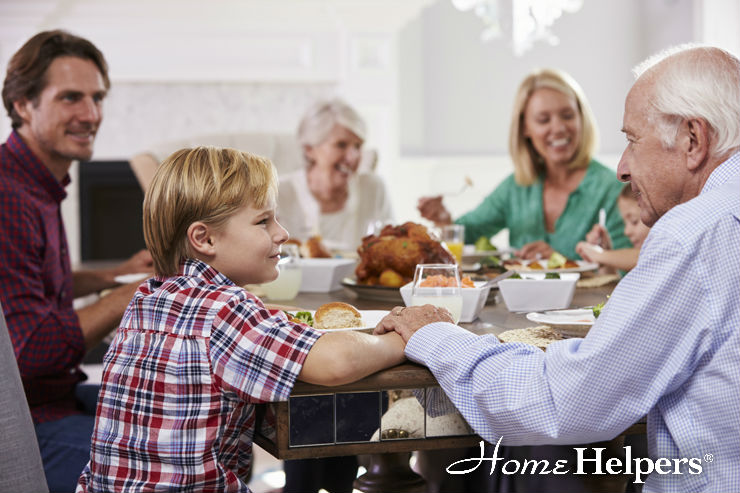It’s that time of the year where family and turkeys converge. The big Thanksgiving get-together is traditionally a time to share a meal, gratitude for the good things in our lives, and just good fellowship with those we love. Many of us are mindful of our diets, including seniors, so how do you help everyone eat healthy at the Thanksgiving feast? Here are a few tips.
1. Eat Healthy by Cooking at Home
While cooking at home for Thanksgiving can be a bit stressful, why not divide up the jobs and let others help? It can be a wonderful time to be together and give you a much healthier option by knowing exactly what’s in your food. With a little planning, you can decide who is bringing which dish, share kitchen duties and even make sure the food lands on the table at the same time. The key is not to take it all on yourself.
While it might be tempting to just forget all that eat out, many seniors of dietary needs that will not easily be met in a restaurant. Commercially prepared food is often full of sugar, preservatives and sodium, all of which is terrible for our health, especially the fragile health of our senior loved ones. While cooking at home might be more work, it’s also a great way to be together, and you won’t be spending the next week trying to undo the effects of bad food on diabetes and high blood pressure.
Another tip as you cook Thanksgiving meal for seniors is to make sure the foods you choose are soft and easy to eat. If you do have chewy food, cut it up in smaller pieces to avoid the risk of choking. Seniors often have sensitivities when it comes to chewing and swallowing food.
It might seem obvious, but make sure that the senior in your life is not alone for Thanksgiving! Perhaps you are a caregiver and the rest of the family can’t make it to see the senior loved one. In this case, set up a Skype session or phone call that will bring a smile to everyone’s face.
2. Think About Travel
Thanksgiving travel can be full of danger, whether it’s icy roads, busy airports or taxis running late. Make sure the senior isn’t driving on their own, even if they are able to drive normally. If there are family gatherings to attend, have a plan in place about who will safely drive them there.
3. Remember that Holidays Can Trigger Lots of Emotions
Thanksgiving holidays and Christmas are a time of joy for many, but they can also conjure sadness and loneliness for others. Holidays can be a painful reminder of loved ones who have passed away or can no longer be with us at home. Be mindful of the senior loved one in your life possible feeling sad or overwhelmed with memories of friends and family who are not there to celebrate this year. You can help ease this pain by talking about the loved ones who have passed, sharing a memory out loud, saving them a seat of honor, or going around the table and sharing stories about favorite friends and family.
The main thing to remember is that there is no magic formula. You just need to be sensitive to how the seniors are feeling. They may have no trouble at all, or they may seem a little withdrawn. Whatever the case, don’t miss out on the opportunity to love on them a little more, schedule calls with other family members so they can connect, and ask them questions that allow them to tell their stories. Most seniors love to talk about the past. Your job is just to listen.
Home Caregiving
If Thanksgiving is not possible for your older adult, consider bringing in a home caregiver who can help during this time. Caregivers can be the next best thing to family, no matter what time of the year it is! For more information on how to help seniors get through the holidays, please contact us today! It doesn’t have to be stressful.
Legal Disclaimer
This blog provides general information and discussions about medicine, health, and related subjects. The words and other content provided in this blog, and in any linked materials, are not intended and should not be construed as medical advice. If the reader or any other person has a medical concern, he or she should consult with an appropriately-licensed physician or other healthcare workers.
Never disregard professional medical advice or delay in seeking it because of something you have read on this blog or in any linked materials. If you think you may have a medical emergency, call your doctor or 911 immediately.
The views expressed on this blog and website have no relation to those of any academic, hospital, practice or other institution with which may have been mentioned or linked to in the article.

